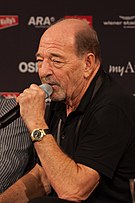71 songs written by 147 songwriters have won the Eurovision Song Contest, an international song competition organised annually by the European Broadcasting Union. The contest, which has been broadcast every year since its debut in 1956 (with the exception of 2020), is one of the longest-running television programmes in the world. The contest's winner has been determined using numerous voting techniques throughout its history; centre to these have been the awarding of points to countries by juries or televoters. The country awarded the most points is declared the winner.[1] The first Eurovision Song Contest was not won on points, but by votes (two per country), and only the winner was announced.[2]
There have been 68 contests, with one winner each year except for the tied 1969 contest, which had four. 27 countries have won the contest, with Switzerland winning the first contest in 1956. The countries with the highest number of wins are Ireland and Sweden with seven wins each. Two people have won more than once as a performer: Ireland's Johnny Logan, who performed "What's Another Year" in 1980 and "Hold Me Now" in 1987, and Sweden's Loreen, who performed "Euphoria" in 2012 and "Tattoo" in 2023. Logan is also one of seven songwriters to have written more than one winning entry ("Hold Me Now" in 1987 and "Why Me?" in 1992, performed by Linda Martin),[3] and is the only person to have three Eurovision victories to their credit, as either singer, songwriter or both. The other six songwriters with more than one winning entry to their credit are Willy van Hemert (Netherlands, 1957 and 1959), Yves Dessca (Monaco, 1971 and Luxembourg, 1972), Rolf Løvland (Norway, 1985 and 1995), Brendan Graham (Ireland, 1994 and 1996), and Thomas G:son and Peter Boström (both for Sweden's entries in 2012 and 2023).
Relatively few winners of the Eurovision Song Contest have gone on to achieve major success in the music industry. The most notable winners who have gone on to become international stars are ABBA, who won the 1974 contest for Sweden with their song "Waterloo",[4] and Céline Dion, who won the 1988 contest for Switzerland with the song "Ne partez pas sans moi".[5] More recently, Duncan Laurence, who won the 2019 contest for the Netherlands with "Arcade", experienced worldwide streaming success with the song as a sleeper hit throughout 2020 and 2021, with the song becoming the most streamed Eurovision song on Spotify.[6] while Måneskin, winners of the 2021 contest for Italy with "Zitti e buoni", subsequently achieved worldwide popularity in the months following their victory.[7]
Since 2008, the winner has been awarded an official winner's trophy of the Eurovision Song Contest. The trophy is a handmade piece of sandblasted glass in the shape of a 1950s microphone.[8] The songwriters and composers of the winning entry receive smaller versions of the trophy. The original design was created by Kjell Engman of Kosta Boda, who specialises in glass art.[9] The trophy is notoriously fragile, and the support infamously broke on stage right after being received by Alexander Rybak, the winner of the 2009 contest,[10] and by Nemo, winner of the 2024 contest.[11] The 2013 winner, Emmelie de Forest, also revealed in an appearance in the 2023 contest that her trophy also broke in the exact same spot.[12] Despite that, no redesigns were made since.
- ^ "Eurovision Song Contest: Rules". ebu.ch. European Broadcasting Union. 12 January 2017. Archived from the original on 22 April 2022. Retrieved 27 February 2021.
- ^ "Eurovision Winners". www.esc-history.com. Archived from the original on 21 February 2024.
- ^ O'Connor, John Kennedy (2007). The Eurovision Song Contest – The Official History. Carlton Books, UK. ISBN 978-1-84442-994-3.
- ^ "ABBA's Bjorn says no to reunion". BBC News. 6 December 2005. Archived from the original on 8 September 2015. Retrieved 15 March 2008.
- ^ Dillon, Brian (11 May 2022). "The moment a young Celine Dion was launched from Dublin stage to global stardom". DublinLive. Archived from the original on 22 May 2022. Retrieved 24 May 2022.
- ^ "Duncan Laurence Has 'No Idea' How His Breakthrough Single 'Arcade' Keeps Going Viral". Billboard. 10 June 2021. Archived from the original on 11 June 2021. Retrieved 11 June 2021.
- ^ Garl, Emma. "How Måneskin revived rock 'n' roll for Gen Z". Alternative Press Magazine. Archived from the original on 28 January 2023. Retrieved 28 January 2023.
- ^ "Eurovision Crystal Trophy". Kosta Boda. Archived from the original on 16 May 2021. Retrieved 31 May 2019.
- ^ "Trophy". Eurovision.tv. EBU. 16 May 2019. Archived from the original on 28 February 2021. Retrieved 31 May 2019.
- ^ "Rybak admits breaking Eurovision trophy". Digital Spy. 19 May 2009. Retrieved 5 August 2024.
- ^ "'It just shattered' - Nemo explains broken Eurovision trophy". Retrieved 5 August 2024.
- ^ West-Soley, Richard (2 July 2013). "Eurovision 2024 Denmark: Emmelie's broken trophy fixed for exhibition - ESCToday.com". Eurovision News, Polls and Information by ESCToday. Retrieved 5 August 2024.





